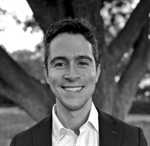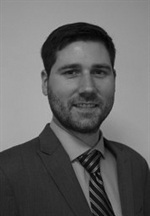Current Laughlin Fellows
Each year, The College selects 12 third, fourth and fifth-year Residents from the United States and Canada and pays for them to attend our Annual Meeting. The Laughlin Fellows are chosen from an elite pool of applicants deemed likely to make a significant contribution to the field of psychiatry. They participate in all educational and social functions held during the Annual Meeting, making valuable contacts with their peers and College Members.
2026 Laughlin Fellows |
Allison Chang. M.D.Dr. Allison Chang is a current first-year Child and Adolescent Psychiatry Fellow at Stanford University. She received her medical degree from the University of Utah School of Medicine and completed her adult psychiatry residency training at the University of Hawai’i. |
 |
Trisha Chau, M.D.Dr. Trisha Chau is a third-year psychiatry resident at UTHealth Houston. She received her medical degree from Oregon Health & Science University. A recipient of the APA Diversity Leadership Fellowship, she is deeply committed to advocacy, community engagement, and psychotherapy. |
 |
Gaby Dressler, M.D., MBEDr. Gaby Dressler is a fourth-year resident at the University of California, San Francisco, and serves as chief resident at San Francisco General Hospital. Originally from Delaware, she studied English and Russian Literature at Columbia University before working in the film industry in New York. Transitioning careers, she then completed a Masters in Bioethics from Harvard Medical School and earned her medical degree from Brown University.
Dr. Dressler’s clinical interests include substance use disorders, psychotherapy, and integrated care. She is currently a second-year trainee in the Psychoanalytic Psychotherapy Training Program through the San Francisco Center for Psychoanalysis and plans to pursue a fellowship in addiction psychiatry. After training, she hopes to continue working to enable equitable access to treatment for substance use disorders, honing her skill as a clinician educator, and deepening her psychotherapeutic expertise. |
 |
Norman Greenberg, M.D.Dr. Norman R. Greenberg is chief resident of education at Weill Cornell Medicine and a psychoanalytic candidate at Columbia University. He completed his medical training at Yale School of Medicine and has clinical interests in psychodynamic psychotherapy and personality disorders. He has received several clinical awards, including the Norma Bailey Berniker Prize. Dr. Greenberg is dedicated to improving psychiatric care through the education of psychiatry residents and other medical practitioners. At Weill Cornell, he directs the Introduction to Psychopathology course for psychiatry residents, lectures on personality disorders and agitation management, and is studying the early integration of psychotherapy education in psychiatry resident training. |
 |
Mikaela Kelly, M.D., M.P.H.Dr. Mikaela Kelly is a fourth-year psychiatry resident at Stanford, dedicated to working at the intersection of mental and reproductive health. Dr. Kelly earned her M.D. at UCLA as a David Geffen Scholar, graduating AOA, as well as her MPH at Johns Hopkins, where she was a Sommer Scholar. Prior to psychiatry, she trained in Obstetrics and Gynecology, bringing a unique perspective to her work.
Dr. Kelly's research has focused on the mental health needs of youth in the judicial system who are survivors of sexual exploitation. She has presented nationally and published in support of survivor-centered care. In residency, she has held leadership positions in Stanford’s Graduate Medical Education Diversity Committee, the Department of Psychiatry’s DEI Advisory Committee, and the GME Wellness Committee. |
 |
Poojajeet Khaira, M.D.Dr. Poojajeet Khaira is the Academic Chief Resident at MetroHealth Hospital – Case Western Reserve University and a University Hospitals Public and Community Psychiatry Fellow. She serves as Chair of the APA Assembly Committee of Resident-Fellow Members, Vice Chair of the APA/APAF Leadership Fellowship, and Co-Chair of the APA Resident-Fellow Member Caucus. She also chairs the Ohio Psychiatric Physicians Association’s (OPPA) Resident-Fellow Member and Social Media Committees. Additionally, she is co-founder of the Sikh Mental Health Summit.
Dr. Khaira has received multiple honors, including the 2025 Association of Academic Psychiatry Resident Psychiatric Educator Award, 2025 APA William Sorum Assembly Resident-Fellow Member Award, the 2025 OPPA President’s Award, and the 2022 U.S. Public Health Service Excellence in Public Health Award.
Her work focuses on workplace violence prevention, medical education, advocacy, and cultural psychiatry, and she has authored multiple action papers passed by the APA Assembly. |
 |
Eric Miller, M.D.Dr. Eric Miller is a resident in the R25 research training program of the Brown University Psychiatry Residency. His undergraduate studies at Carnegie Mellon University combined computer science and neuroscience. He later completed medical school at U.C. San Diego, followed by an internship at the University of Arizona, before joining the Brown residency. Dr. Miller’s clinical interests are in psychotherapy and psychodynamic approaches to psychopharmacology. His research utilizes computational methods to investigate topics ranging from sensorimotor processing in animal models of autism to predictors of real-world outcomes in a ketamine clinic. He plans to investigate how psychedelics change cognition, aiming to understand mechanisms of action, as well as safety considerations. |
 |
Julio Nunes, M.D.Dr. Julio Nunes is Chief Resident of Outpatient and Addiction Services in the Yale Department of Psychiatry and a Leadership Fellow of the American Psychiatric Association. His work focuses on addiction, chronic pain, and health disparities, with an emphasis on translating research into patient-centered policy, advocacy, and practice. |
 |
Brendan Ross, M.D.Dr. Brendan Ross is a third-year psychiatry resident at Mount Sinai Hospital. Originally from rural Missouri, he completed his undergraduate studies before teaching American history in southern China. He earned his medical degree at McGill University in Montreal. During medical school, Dr. Ross conducted Fulbright research on Indigenous mental health access and traditional healing in Taiwan, later sharing this work through a Pulitzer Fellowship project published in The Washington Post. His clinical interests focus on consultation-liaison, palliative care, and geriatric psychiatry, particularly psychiatric care for patients with serious medical conditions and end-of-life care. Currently, Dr. Ross is collaborating on a clinical trial studying psilocybin-assisted psychotherapy for survivors of genocide. He serves on Mount Sinai's Global Mental Health Track, leading psychiatry personnel training for resource-scarce communities and providing psychiatric precepting in a student-run free clinic in East Harlem. Outside of work, he enjoys backpacking, drawing in pen and ink, and writing when he can. |
 |
Steven Server, M.D., Ph.D.Dr. Steve Server is a third-year resident at the University of California, Los Angeles Semel Neuropsychiatric Institute. Prior to residency, he completed M.D. and Ph.D. training in the history and philosophy of science at the University of Chicago. There, he developed undergraduate courses in clinical medical ethics and the social studies of medicine. His dissertation focused on the social, political, and emotional dimensions of medical education in 1930s Mexico. As a resident, he has continued to advocate for humanistic medical education and clinical care. As Education Chief of the residency program, he is designing a longitudinal social sciences didactic thread, in addition to a specific series in the history of psychiatry. |
 |
Mary Shen, M.D., M.S.Dr. Mary Shen is a PGY-4 psychiatry resident at Brigham and Women’s Hospital/Harvard Medical School. She previously trained for four years in general surgery at the University of Michigan, where she was a NIH T32 research fellow, publishing over 35 peer-reviewed articles with an emphasis on surgical culture, mentorship, and workforce wellbeing. A graduate of the University of North Carolina and Columbia University, she has received several awards for her work in culture-building, education, mentorship and the advancement of women in medicine. Her current clinical and academic interests include interventional psychiatry, addiction psychiatry, and physician wellbeing. She is passionate about cultural psychiatry, helping to pilot a new AAPI clinic at BWH, and writing for the public topics of race and mental health. She hopes to build a career at the intersection of cultural psychiatry, academic leadership, and innovation in mental health care. |
 |
Camila Velez Florez, M.D.Dr. Camila Velez Florez is a fourth-year resident and Administrative Chief in the Mass General Hospital/McLean Psychiatry Residency Program and Physician Scientist Training track. Originally from Colombia, she obtained her medical degree from Universidad del Rosario in Bogotá. She worked as a hospitalist for three years before pursuing a postdoctoral research fellowship at the Children's Hospital of Philadelphia. She contributed to a National Science Foundation-funded project addressing COVID-19-related equipment shortages. She currently serves as Diversity Leadership Fellow with the American Psychiatric Association. Her career is dedicated to improving equity in mental health services, promoting culturally congruent and safe community engagement, and equitable mental health services delivery for marginalized communities. |
2025 Laughlin Fellows |
Adam Burroughs, M.D.Dr. Adam Burroughs graduated from the University of Arkansas summa cum laude and was inducted into the Phi Beta Kappa honor society. He completed medical school and residency at the University of Arkansas for Medical Sciences (UAMS) where he served as the Chief Resident and is now a geriatric psychiatry fellow. He is his department’s Health Education and Development Talk director producing educational content on YouTube to facilitate interdisciplinary education. He has an interest in clinical ethics regarding the emerging treatments for Alzheimer’s disease. His experience in clinical ethics extends into the area of older adult driving. He created and presented materials on assessing and counseling older drivers at medical meetings in Arkansas, to the public, nationally and a book chapter is in the works. Outside of work, he enjoys exercising, service with his local church community, and spending time with his wife, one-year-old son and dog (Wookiee Baggins). |
 |
Donald Egan, M.D., M.P.H.Dr. Donald Egan is a fourth-year chief resident in psychiatry at the University of Texas Southwestern Medical Center. He is the founder of the Disability Advocacy, Research, and Education at UT Southwestern (DARES) organization, which aims to reduce stigma surrounding disability and chronic illness in healthcare. As an American Psychiatric Association (APA) Diversity Leadership Fellow, Dr. Egan has contributed to national conferences, delivered speeches, appeared on podcasts, and published on disability awareness, alongside serving on the APA Council on Addiction Psychiatry.
During residency, Dr. Egan developed an interventional psychiatry concentration for residents and introduced LGBTQ+ mental health education and training opportunities. These initiatives have informed his research on the intersection of interventional psychiatry and substance use, particularly within LGBTQ+ communities.
Following residency, Dr. Egan plans to pursue an addiction psychiatry fellowship and continue his work as a physician-scientist dedicated to advancing understanding in addiction and inclusive mental health care. |
 |
Jack Hunt, M.D., Ph.D.Dr. Jack Hunt is a fourth-year resident in the research residency track program at UC San Diego. He is passionate about promoting healthy and equitable mental aging in individuals and populations. He has a breadth of research experience spanning molecular neuroscience, pre-clinical animal and stem cell modeling to human neuroimaging cohort studies. Dr. Hunt is interested in bringing this multi-level and multidisciplinary perspective to understand risk and protective factors in cognitive aging and to improve mental health outcomes in individuals and our aging population. Prior to residency, Dr. Hunt completed an M.D, and Ph.D. in Cellular and Molecular Neuroscience at the University of Wisconsin - Madison. He currently lives in San Diego with his wife and two rambunctious and hilarious kids (ages 4 and 7) and loves playing music and spending time outside. After graduation, he plans to complete a Fellowship in Geriatric Psychiatry. |
 |
Madeline Jansen, M.D., M.P.H.Dr. Madeline Jansen is a research fellow in Child and Adolescent Psychiatry at the University of California, Los Angeles. As a National Institute of Health T-32-funded research scholar at UCLA, Dr. Jansen’s research focuses on the development and implementation of culturally sensitive psychotherapies with a focus on multiracial populations.
Dr. Jansen is a graduate of Stanford University, Tulane School of Medicine and Public Health, Washington University Psychiatric Residency, and UCLA Child and Adolescent Psychiatry Fellowship. A recipient of the competitive NIMH Child Intervention Prevention and Services Research Fellowship, Dr. Jansen is devoted to improving the mental health and well-being of our most vulnerable youth in both research in clinical practice. |
 |
Amanda Koire, M.D., Ph.D.Dr. Amanda Koire is a first-year Attending Psychiatrist in the Division of Women's Mental Health at Brigham and Women's Hospital, a Research Scientist at the Mary Horrigan Connors Center, and a consultant for the perinatal access line for the state of Massachusetts. During residency at Brigham and Women’s Hospital she was an APA Leadership fellow, an AWP fellow, and co-founded Repro Psych Trainees, a national interest group for women’s mental health.
Her research focuses on maternal mental health and improving perinatal access to evidence-based psychiatric care through educational interventions. In her free time, she enjoys exploring Boston with her husband and two kids, eating eclairs, and watching NCAA gymnastics. |
 |
Yang Jae Lee, M.D.Dr. Yang Jae Lee’s interest in the Busoga region of Uganda began in 2015, when he conducted research on traditional medicines and health systems journalism during college. In 2018, during his first year of medical school at Washington University in St. Louis, he founded Empower Through Health, a nonprofit providing medical care to 10,000 people annually and psychiatric services to a population of over 400,000.
He also established the Global Health Experiential Fellowship, which offers in-person research experiences to pre-doctoral students from Uganda and the U.S. with 160 alumni. He has established a productive research infrastructure within ETH, resulting in the publication of 8 peer-reviewed original research in the past 2 years, with an additional 14 more expected by the end of 2025. His research interests are behavior change, mental illness stigma, and intervention development, while his organizational efforts focus social entrepreneurship and sustainable development. |
 |
Andrew Murphy, M.D., Ph.D.Dr. Andrew Murphy is a graduate of the combined M.D.-Ph.D. program at the University of Pennsylvania, completed his Ph.D. in the Complex Systems Group in the Department of Bioengineering, working with Dani Bassett, on the use of non-invasive neurostimulation for neuropsychiatric disorders.
His dissertation focused on characterizing how individual differences in functional and structural brain connections contribute to variations in behavior, publishing papers in PLoS Biology and Nature Communications. Following completion of the M.D.-Ph.D. program, Dr. Murphy began the psychiatric residency program at Columbia University as a Leon Levy Fellow in Neuroscience. In this program he received numerous awards, including NIMH Outstanding Resident Award, the Laughlin Fellowship of The American College of Psychiatrists, and resident research awards from the Southern Psychiatric Association and the New York County Psychiatric Association. Now working with Dr. Dan Javitt in the Division of Experimental Therapeutics, his current research focuses on the network-level effects of TMS and leveraging these effects to improve clinical outcomes for TMS in treatment resistant depression and auditory hallucinations. |
 |
Miriam Muscarella, M.D.Dr. Miriam Muscarella is a second-year child and adolescent psychiatry fellow at Stanford University. Originally from Kentucky, she completed her undergraduate studies at Harvard College in Studies of Women, Gender, & Sexuality. After graduation, she completed a public service fellowship for children and families impacted by differences of sex development (DSD)/intersex traits. She also served in varied roles US and international research, advocacy, and support to improve care for individuals with DSD/intersex traits while co-creating a comprehensive puberty and psychoeducational site for teens (dsdteens.org).
Dr. Muscarella completed her M.D. at University of California, San Francisco. She then completed her psychiatry residency at Stanford University, where she served as a Chief Resident. At Stanford, Dr. Muscarella has also worked in Stanford Children’s DSD Clinic and with individuals in the LGBTQI+ community, as well as on national and international networks to improve care and support for patients and families. |
 |
Parvaneh K. Nouri, M.D. M.P.H.Dr. Parvaneh K. Nouri is a current forensic psychiatry fellow at the University of Colorado, where she also completed her residency training in adult psychiatry and served as Administrative Chief Resident. During her training, Dr. Nouri was awarded the APA/APAF Edwin V. Valdiserri Correctional Public Psychiatry Fellowship, 2021-2023.
Dr. Nouri was able to leverage this fellowship with her residency program to design a training experience that afforded her greater exposure to care in correctional settings. She also completed a 3-year clinical track in women’s mental health. With these two interests, she helped pilot a perinatal psychiatry clinic in her local women’s prison facility that continues to serve patients. After training, she plans to continue working at the interface of correctional care and women’s mental health through clinical work, legislative advocacy, and academic engagement. |
 |
Tempitope Ogundare, M.D., M.P.H.Dr. Temitope Ogundare is a fourth-year psychiatry resident, schizophrenia fellow, and chief resident at Boston Medical Center and a postgraduate fellow at the Massachusetts Institute for Psychoanalysis. He completed his medical education at the University of Ilorin College of Health Sciences in Nigeria and earned an MPH in community assessment, program design, implementation, and evaluation with a concentration in mental health and substance use from the Boston University School of Public Health. He currently serves as a Deputy Editor for the American Journal of Psychiatry Residents’ Journal, having previously held the position of Associate Editor. His numerous awards include the Egerton Luke Prize from the West African College of Physicians, the International Medical Graduate Award from the Association of American Directors of Psychiatric Residency Training, and the American Psychiatric Association Foundation Public Psychiatry Fellowship.
Dr. Ogundare developed the neuroscience curriculum for the Liberian College of Physicians and Surgeons’ psychiatry residency program and is actively involved in creating a fellowship curriculum. In addition, he teaches neuroscience topics and basic statistics and facilitates journal clubs for Liberian psychiatry residents. His professional interests encompass global mental health, medical education, public psychiatry, emergency psychiatry, and psychosis. He has published over twenty papers in high-impact journals. Additionally, he is a critically acclaimed poet, with his second poetry collection being a finalist for the Association of Nigerian Authors’ Poetry Prize.
Upon completing his residency, he is set to begin a Public Psychiatry fellowship at Columbia University. |
 |
Shelby Powers, M.D., M.S.Dr. Shelby Powers is an addiction psychiatry fellow at Yale University. She earned her medical degree from the Brody School of Medicine at East Carolina University, where she also obtained a master’s in biomedical sciences studying animal models of pelvic cancer treatment. She trained in general psychiatry at Duke University Medical Center where she served as both emergency psychiatry and outpatient chief. Dr. Powers also completed the program’s psychotherapy track and was a fellow at the Psychoanalytic Center of the Carolinas.
Dr. Powers lives in Connecticut with her husband and 3-year-old son. She enjoys gardening, Nordic Noir and watching professional cycling. |
 |
Juliana Zambrano, M.D., M.P.H.Dr. Juliana Zambrano is a fourth-year resident in the Mass General Hospital/ McLean Psychiatry Residency Program and Physician Scientist Training Program. She is originally from Colombia and grew up between there and the United States. Dr. Zambrano attended medical school at Universidad de los Andes in Bogota, Colombia.
She then completed a master’s in public health at the Harvard T.H. Chan School of Public Health and a postdoctoral research fellowship in cardiac psychiatry at Massachusetts General Hospital. Her clinical interests include Hispanic psychiatry, depression and trauma-related disorders, and psychedelic-assisted therapies (PAT). Her research is focused on implementation science of psychedelic-assisted psychotherapies for Latinx and other marginalized populations, group PAT, and PAT for psychosomatic disorders. She is a 2023-2024 SAMHSA Minority Fellow |

